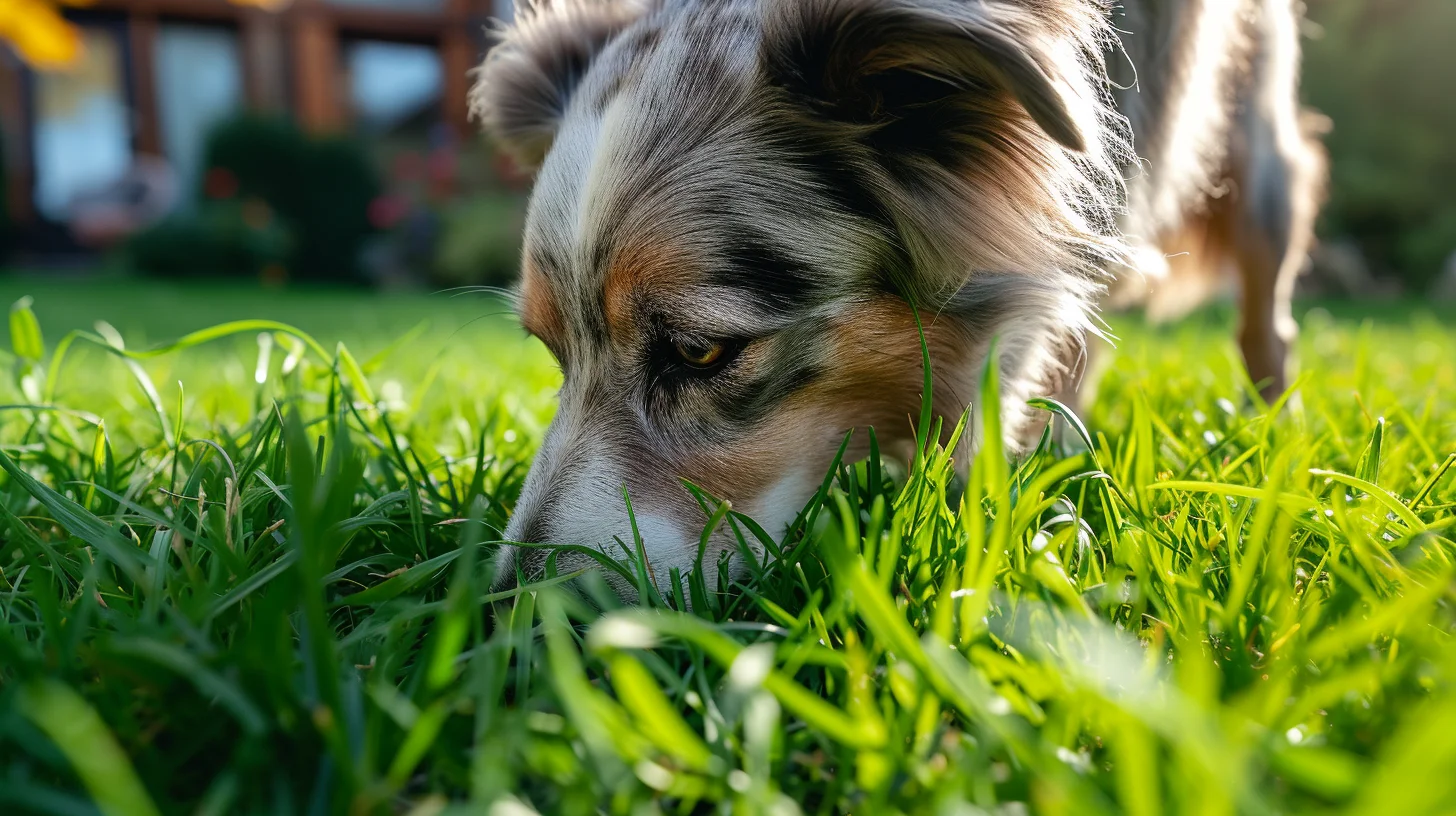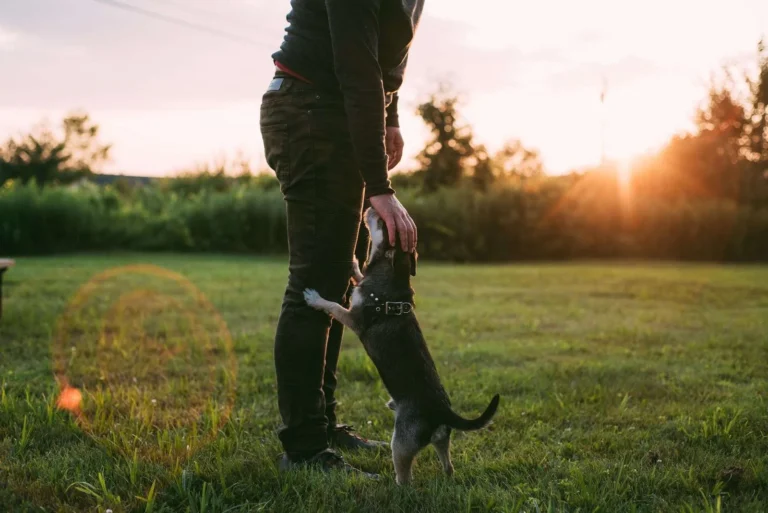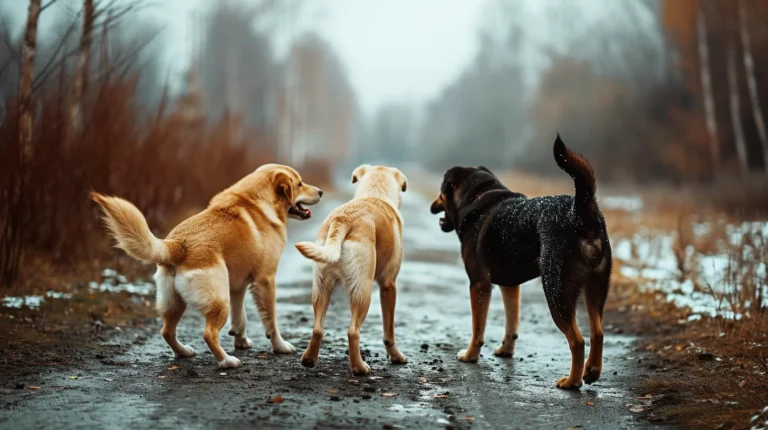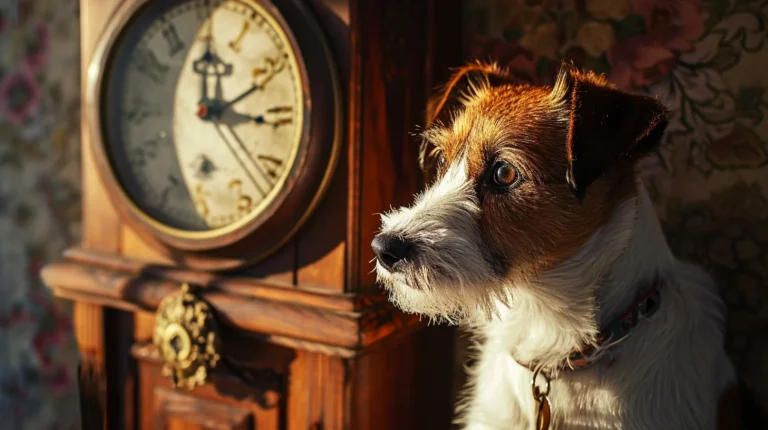Why do Dogs Eat Grass? Understanding Common Canine Behaviour
We’ve all seen dogs eating grass, and most of us at some time have probably assumed that because a dog is eating grass, it must be unwell.
But that’s not necessarily the truth. In this article we’ll take a look at some of the reasons your dog might be eating grass.
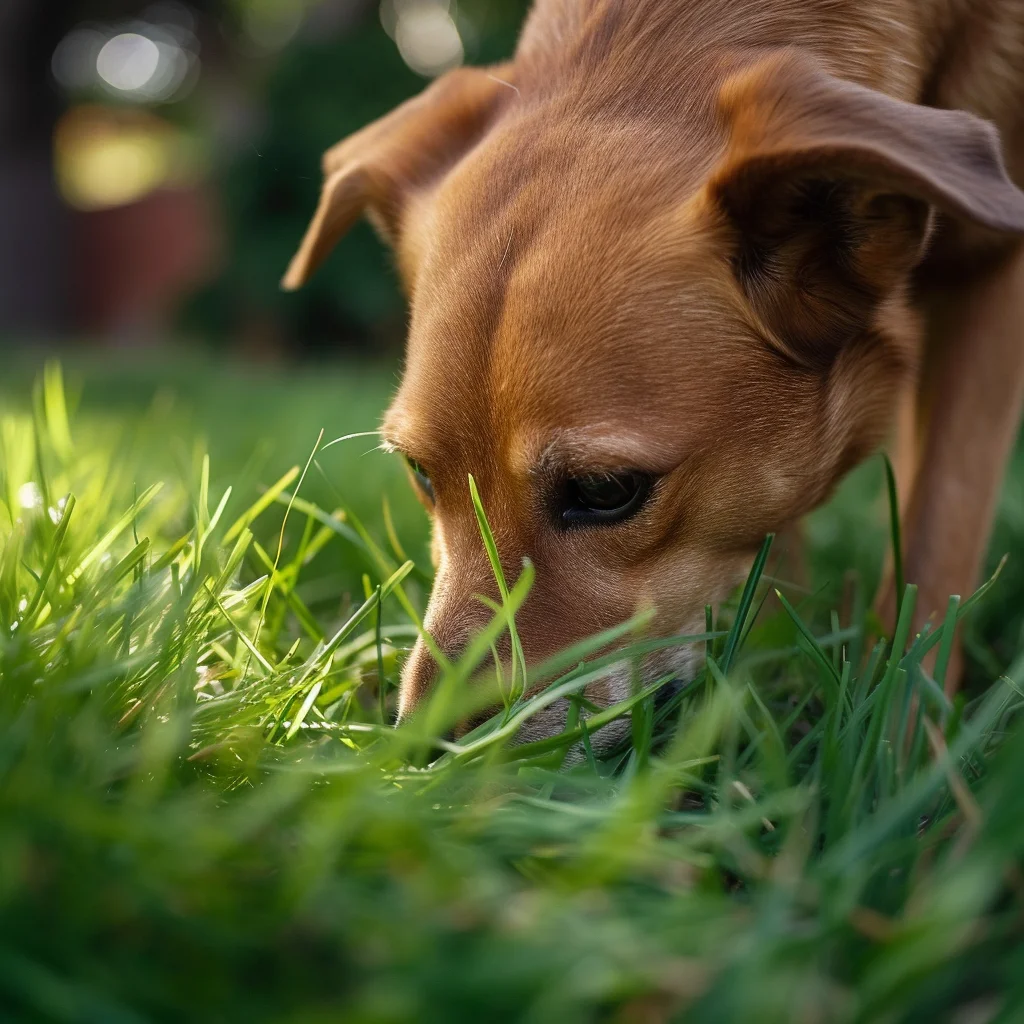
Dogs have Been eating Grass Forever!
The sight of dogs eating grass is a behaviour which has been observed for centuries, with various interpretations. Historically, it was often considered an instinctive attempt to induce vomiting, a way for dogs to expel something upsetting their stomachs.
However, recent studies suggest more nuanced reasons.
Some think it’s a means to add fibre or other missing nutrients to their diet, or even a simple manifestation of a dog’s natural curiosity and scavenging behaviour.
While it’s not fully understood, this behaviour doesn’t usually indicate illness, and it’s a common trait seen across different breeds and ages of dogs.
Exploring the Myths and Facts Behind Dogs and Grass Consumption
If you’ve ever caught your pet grazing on your lawn, you may wonder about the reasons dogs eat grass. Several myths prevail, but what does science actually tell us about dogs and grass consumption?
This section looks at some common beliefs and brings the nutritional and veterinary perspectives into focus, offering a clearer picture of this common habit.
Is munching on grass a cause for concern, or just another day in the life of a dog?
Debunking Myths Surrounding Canine Grass Consumption
The most common belief is that dogs eating grass do so out of illness, and another suggests they intuitively seek grass to relieve an upset stomach. However, evidence shows that these behaviours are not indicative of health issues most times.
- Myth: Dogs only eat grass when they’re feeling unwell.
- Fact: Although dogs do sometimes eat grass when they feel unwell, they may eat grass for its texture and taste or a variety of non-medical reasons.
- Myth: Eating grass always leads dogs to vomit, suggesting self-medication.
- Fact: Not all dogs vomit after consuming grass and may simply enjoy the activity.

Do Dogs Get Nutrition from Grass?
Is there any nutritional justification for dogs ingesting grass? The digestive system of a dog processes meat and plants differently, and grass itself is not a substantive source of nutrition. However, the act may fulfil other needs unrelated to their dietary requirements:
- Grass contains fibre, which could aid in intestinal motility.
- Grass eating may show boredom or the need for more stimulation.
- Some think dogs may seek certain grasses for trace minerals.
What Veterinary Science Says About Dogs Eating Grass
Vets consider grass consumption as a common behaviour among dogs. While occasionally it may prompt a visit to the vet, most experts agree it’s a natural part of dog life. But there’s always circumstances when you should take your dog to the vet if it’s eating grass. Here are some:
| Behaviour | When to consult a vet |
| Eating grass frequently | If it’s accompanied by weight loss, changes in appetite, or signs of distress |
| Eating grass and vomiting regularly | If the vomiting is not a one-off, it is always advisable to consult a vet. |
| Preference for grass over regular food | If your dog consistently ignores its meals in favour of grass |
| Sudden increase in grass consumption | Especially if this behaviour change is abrupt and unusual for your pet |
Conclusion
Dogs eating grass is a behaviour that has several theories behind it. One common theory is that dogs eat grass to make themselves vomit when they feel unwell or to help with digestion issues. Some believe that dogs might choose specific types of grass that they instinctively feel will help with their problem.
Another idea is that this behaviour comes from dogs’ wild ancestors. Wild canines like wolves sometimes eat grass, possibly as a way to add fibre to their diet, which can help with digestion.
Dietary deficiency is another theory. Some suggest that dogs might eat grass to make up for a lack of certain nutrients in their diet, especially fibre. This might happen if a dog’s diet is primarily made up of meat and lacks in vegetables or grains.
Lastly, it could simply be a matter of taste or boredom. Some dogs might just like the way grass tastes or eats it when they have nothing better to do.
In most cases, eating grass isn’t something to worry about. It’s generally considered a normal behaviour for dogs. However, if your dog is eating grass frequently and seems to be unwell (like vomiting often), it’s a good idea to check with a vet. Also, make sure the grass they eat hasn’t been treated with pesticides or fertilizers, as these can be harmful to dogs.
Frequently Asked Questions
Q: Why do dogs eat grass?
A: There are several reasons why dogs eat grass, including to soothe an upset stomach, to fill a nutritional need, out of boredom, or simply because they enjoy the taste of grass.
Q: Is it safe for my dog to eat grass?
A: In most cases, eating grass is not harmful to dogs. However, it’s important to ensure that the grass your dog has access to is free from herbicides and pesticides, which can be toxic to dogs.
Q: Should I let my dog eat grass?
A: It’s generally safe to let your dog eat grass, as long as the grass is free from chemicals and your dog does not eat it excessively. If you have any concerns, it’s best to consult with a veterinarian.
Q: What should I do if my dog is eating grass excessively?
A: If your dog is eating grass excessively, it could be a sign that they are not getting enough mental stimulation or that there may be an underlying health issue. Contact your vet to discuss your dog’s behaviour.
Q: Are there any reasons why my dog should not eat grass?
A: Some reasons why your dog should not eat grass include if the grass has been treated with herbicides or pesticides, or if your dog is eating it in excess, which could lead to digestive issues.
Q: Could eating grass be a sign that my dog is unwell?
A: While occasional grass-eating is normal for many dogs, excessive grass consumption could be a sign of an underlying health issue. If you are concerned, it’s best to take your dog to the vet for a check-up.
Q: How can I prevent my dog from eating grass?
A: To prevent your dog from eating grass, ensure they are getting enough mental and physical stimulation, provide a balanced diet, and limit their access to grass if necessary. Consulting with a veterinarian can also provide helpful guidance.
Q: What are some reasons why dogs eat grass?
A: There are several reasons why dogs eat grass, including to soothe an upset stomach, to fulfil a nutritional need, out of boredom, or simply because they enjoy the taste or texture of grass.
Q: Can eating grass cause any health issues for my dog?
A: Eating grass in moderation is generally not harmful to dogs. However, excessive grass consumption or grass treated with chemicals can lead to digestive problems or toxicity. It’s important to monitor your dog’s grass-eating habits and the type of grass they have access to.
Q: What should I do if I think my dog has eaten grass treated with herbicides?
A: If you suspect that your dog has ingested grass treated with herbicides or pesticides, contact your veterinarian immediately. They can provide guidance on potential symptoms to watch for and any necessary treatment.
Thanks for reading! Please remember to visit our shop before you leave

